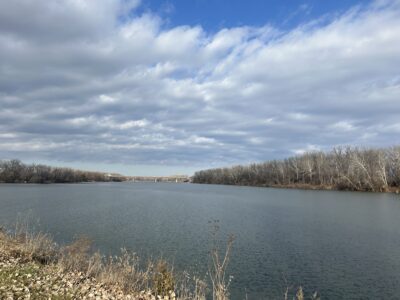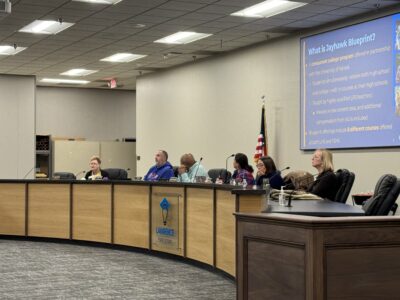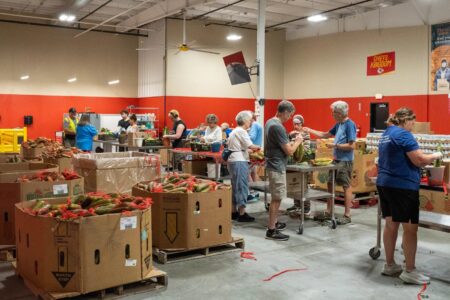‘It’s all of our responsibility’: At Haskell, advocates urge county officials to help care for the Wakarusa River Corridor

photo by: Josie Heimsoth/Journal-World
Several community members gathered with Open Space leaders on Thursday, April 17, 2025 to share their connection to the Wakarusa River Corridor.
Lots of people are involved in the conversations about development to the south of Lawrence, but Chehalis Jones thinks one very important group is being left out — the plants and animals living in the Wakarusa River corridor.
Jones, a freshman at Haskell Indian Nations University, was one of about 20 people who gathered at Haskell’s Tommaney Library on Thursday to talk with Douglas County’s open space leaders about their vision for the future of the river corridor. As Lawrence is looking to expand southward with projects like the proposed New Boston Crossing, and discussions around urban growth and retail development continue, Jones said the idea of businesses developing in the corridor was incredibly disrespectful to Indigenous culture and to the plants and animals that live in that ecosystem.
“It’s really hard for people who are business-focused to fathom the age of what they’re developing over,” Jones said. “… All of the non-human relatives are just as important in Indigenous teachings as any human.”
Thursday’s discussion was the first of many conversations that the county’s open space team hopes to have with people in the county to establish a collaborative plan that reflects the land’s water and ecology, as well as how people use and rely on the land.
From Clinton Lake Dam to Eudora, the open space leaders are working to conserve the Wakarusa River Corridor through the development of this Corridor Vision Plan. The plan will explore the area’s historical context, assess future flooding risks, water demands, nutrient flows, habitats, and more — ultimately shaping a long-term program to guide future decision-making, as the Journal-World reported.
The session on Thursday was hosted by the team creating the plan – two consulting firms, Biohabitats and Hoxie Collective LLC, and Douglas County’s Sustainability Team. It was open to students and faculty at Haskell, but there were also other community members present who were interested in listening to the conversations.
Jessica Hardesty Norris, senior ecologist at Biohabitats, said that the project would involve two phases of community engagement. The first phase is about getting an early sense of who cares about the river, why it matters to them, what they hope for for its future, and what they value most, she said. Then, in the fall, the team will enter a second phase — bringing those ideas back to the community, sharing what the group learned and asking for feedback.

photo by: Josie Heimsoth/Journal-World
Senior Ecologist Jessica Hardesty Norris talks with community members at Haskell Indian Nations University on Thursday, April 17, 2025.
Many people at the discussion referenced the South Lawrence Trafficway project, which faced controversy throughout its development and was entangled in federal lawsuits over whether the road would improperly damage the environmental and cultural significance of the Haskell and Baker Wetlands.
Those concerns haven’t gone away for many in the community, and as development in the wetlands continues, there are people who are worried about what will be left. Tyler Moore, a senior at Haskell, said the SLT cut the wetlands in half and harmed the ecosystem in ways that can still be seen.
“Just the amount of biodiversity that is on one side versus the other … as much as we can do, there’s still a highway cutting (through it),” Moore said. “… It’s still a scar that is not healing.”
Moore said the community needs to make it clear that the Wakarusa River Corridor is an area that needs to be protected.
“It takes a lot of time to rebuild an area once you’ve lost it,” Moore said. “Haskell lost our wetlands for a very long time.” He added that the community has been trying everything it can to get it back.
Courtney King, a research assistant at Haskell, said partnerships with the community to improve the ecosystem’s health could be a start. She said that the entire community had a role to play in restoring the land and making it even more accessible to the Douglas County community.
“We need help,” King said. “People from all walks of life go out there. I’ve seen older people. I’ve seen young children. I’ve seen people from out of state go there, so to take care of it, it’s all of our responsibility, and that has not been the case.”
The project leaders will have several more similar sessions with people around Douglas County, including conversations with other Indigenous leaders, Save the Wakarusa River Valley, tourism and housing groups along with other conservation groups.







